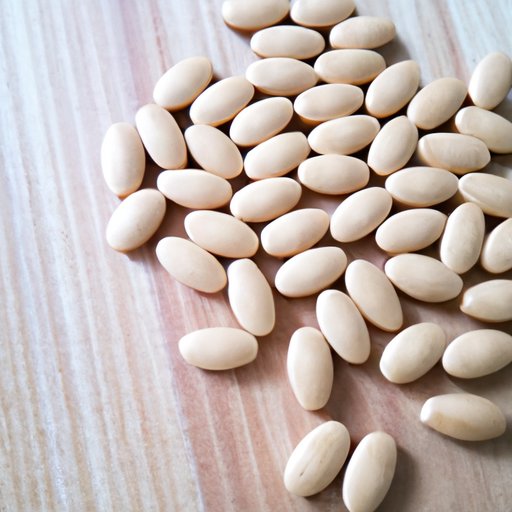Introduction
Biotin is an essential water-soluble B vitamin that plays a key role in a variety of metabolic processes in the body. Also known as vitamin B7 or vitamin H, biotin helps the body convert food into energy and is necessary for the growth and maintenance of healthy cells. It’s found naturally in many foods and can also be taken as a supplement.
Biotin has long been associated with hair, skin, and nail health, but research suggests that it may have other important health benefits as well. In this article, we’ll explore what biotin is, how it works, and what its potential benefits are.
Exploring Biotin: The Essential Vitamin for Hair, Skin and Nail Health
Biotin is an essential B vitamin that plays a crucial role in many metabolic processes in the body. It helps convert carbohydrates, fats, and proteins from food into energy and helps create certain hormones and enzymes that are essential for cell growth and development. Biotin is also important for the production of fatty acids, which help keep your skin, hair, and nails healthy.
What is Biotin and How Does it Benefit Your Health?
Biotin is a water-soluble B vitamin that acts as a coenzyme in a variety of metabolic processes. As a coenzyme, biotin helps facilitate the transfer of carbon dioxide from one molecule to another, which is essential for the production of energy and other molecules. Biotin is also involved in the synthesis of fatty acids, which are important for skin, hair, and nail health.
Biotin helps regulate blood sugar levels, promotes healthy nerve function, and supports the production of hormones, such as insulin and glucagon, which helps control glucose metabolism. It also helps break down carbohydrates, fats, and proteins from food into energy. Additionally, biotin plays a role in DNA replication and repair, which is essential for cell growth and development.
Biotin Deficiency: Signs and Symptoms to Look Out For
Biotin deficiency is rare, but it can occur if you have an underlying medical condition or if you don’t get enough biotin from your diet. Some signs and symptoms of biotin deficiency include hair loss, dry skin, brittle nails, and fatigue. If you think you may be deficient in biotin, talk to your doctor about the best course of action.
The Benefits of Taking Biotin Supplements
Biotin supplements are widely available and can be taken as part of a daily multivitamin or on their own. While there is not enough scientific evidence to support the use of biotin supplements for any specific health condition, some studies suggest that biotin may provide certain health benefits.
An Overview of the Role Biotin Plays in Metabolism
Biotin is involved in several metabolic processes in the body, including the breakdown of carbohydrates, fats, and proteins from food into energy. It also helps regulate blood sugar levels and promotes healthy nerve function. Additionally, biotin is necessary for the production of fatty acids, which are important for skin, hair, and nail health.
Biotin for Weight Loss: Is It Effective?
While there is no scientific evidence to support the use of biotin supplements for weight loss, some studies suggest that biotin may play a role in regulating appetite. One study found that people who took biotin supplements had lower levels of the hunger hormone ghrelin, which could potentially lead to reduced food cravings.
Foods Rich in Biotin: What Should You Include in Your Diet?
Biotin is found naturally in a variety of foods, including egg yolks, organ meats, nuts, seeds, whole grains, legumes, and certain vegetables. Here are some examples of biotin-rich foods:
- Egg yolks
- Organ meats (liver, kidney)
- Nuts and seeds (almonds, walnuts, sunflower seeds)
- Whole grains (oats, barley, brown rice)
- Legumes (chickpeas, lentils, beans)
- Vegetables (cauliflower, spinach, broccoli)
Tips on How to Incorporate More Biotin-Rich Foods into Your Diet
Adding more biotin-rich foods to your diet is a great way to make sure you’re getting enough of this important vitamin. Here are some tips to help you incorporate more biotin-rich foods into your diet:
- Add eggs, nuts, and seeds to salads, soups, and smoothies.
- Substitute white rice for brown rice or wild rice.
- Snack on raw almonds, walnuts, or pecans.
- Make a vegetarian stir-fry with cauliflower, spinach, and other vegetables.
- Include chickpeas, lentils, or beans in your meals.
Conclusion
Biotin is an essential B vitamin that plays a key role in a variety of metabolic processes in the body. It helps convert carbohydrates, fats, and proteins from food into energy, regulates blood sugar levels, and promotes healthy nerve function. Biotin is also important for the production of fatty acids, which are essential for skin, hair, and nail health.
Research suggests that biotin may have other potential benefits, such as helping to regulate appetite and aiding in weight loss. Biotin is found naturally in many foods and can also be taken as a supplement. Incorporating more biotin-rich foods into your diet is an easy way to make sure you’re getting enough of this important vitamin.
Overall, biotin is an important nutrient for overall health. It plays a crucial role in many metabolic processes and is essential for skin, hair, and nail health. Getting enough biotin from your diet or through supplementation is important for maintaining good health.


